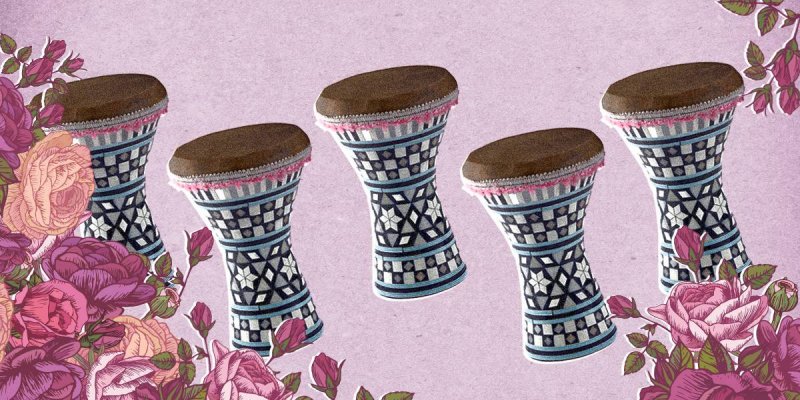It is believed that bongo drums are the oldest music instruments known to humans. They were first found in the ancient civilizations of India and Egypt.
In Arabic music, the Tabla is heavily incorporated in musical productions across genres, and often associated with belly dancing. There is a certain style of drumming that completes the art of belly dancing; challenging the dancer to continuously shift [her] speed, rhythm, and patterns of movement.
The spectator watches the two artists in conversation, the dancer with her body, and the drummer with the tabla. In nightclubs or in movies, the gendered roles for the two artists are already presumed and expected. Perhaps this is why when two young women, Donia and Rania, posted a Facebook video of them drumming at a car, it went viral!
Donia and Rania first met on Facebook, when they found videos of each other drumming. They formed a friendship and made many videos together, drumming in Rania’s car. They were then hosted on several talk shows, and asked the same questions about their experience of playing an instrument that is both stigmatized and gendered.
The Tabla player is not as appreciated and respected as other artists. The fact that drummers play in weddings and nightclubs makes it the opposite of “high art,” and therefore unfit for women. “If I was playing the violin, they would not have shamed me,” says Donia. When she first started drumming, she hadn’t taken her hijab off yet, so she was faced with more criticism. In a way, women wearing hijab can feel more policed and criticized for their choices, and their actions are seen as dishonoring of the religious value of hijab.
“Your Hijab does not go well with the percussion drums,” Rania was often told. She started drumming at the age of 15 before forming her first band “hip-hop project” while in college. Today, both drummers dream of starting a music school that focuses on training girls on different percussion instruments. “Tabla can be entertaining and joyful. I believe it helps us get rid of the negative energy within us,” Rania explains. Despite the comments she gets while walking in the streets with her instrument, she still feels proud and happy to carry it around with her. The two have several videos playing in public spaces, drawing people around them, watching and dancing.
Some of those commenting at their videos or in the streets question them: “if you’re the drummer, then who’s going to be the dancer?” Others would question their femininity and wonder if their hands and fingers were alright! The gendered expectations continue to be in play, though slowly challenged by these artists. “I met many women interested in drumming after my videos went viral,” says Donia.
For no charge, she tries to help women learn the Tabla, sometimes giving them lessons over the phone! Although they are self-taught, they have been taking classes, while performing across Cairo, even in big venues. Rania has already graduated college with a business degree, while Donia continues to study at the Higher Institute of Theatrical Arts. One mysterious part about these two ladies is their car performances. Many of their videos are recorded in cars. Donia has a video with another drummer, sitting in a car over a bridge with the doors open.
Even wilder, Rania has a thing for drumming while driving! Somehow, in the crazy traffic of Cairo, she manages to drum with her hands and drive with her feet. She finds it fun and normal, but online users totally disagree with her; which is maybe why she has stopped posting similar ones lately.
The two women seem to find a safe haven in cars, for them to practice, record, and be in public. Yet, following their recent popularity, they now have studio time, classes, and pop-up performances in public spaces. “I no longer listen to the street comments I get. I put my headphones on and keep walking,” says Donia. After her fame, she had to break up with her fiancée who thought it was inappropriate for women to play Tabla, and was bothered by the kind of attention she was getting. “I chose my art over him and will always do.”
Donia has been collaborating with “Said El-Artist”, an old percussion master who regularly trains young talents and include them in his own performances. Some of these shows have been posted on YouTube, sometimes having more than four girls playing sets on stage with him. The truth is women playing Tabla is not at all a strange thing- yet it was never a profession for them. Women can be traditionally seen playing the Tabla in social settings, especially in rural areas. It is perhaps with modernity that certain social rituals disappear and get replaced by fixed performances.
Said El Artist, the man who is now leading Donia and other young drummers, has been training women on Tabla for decades. He has once performed with six women drummers on stage at the 1997 Arab Music Festival.
After the Jan25 revolution, we saw women drumming while marching. In protests relating to violence against women, drummers were the ones to lead and chant. They have created some sort of a protest culture for women groups in Cairo. It is no question that following the 2013 coup in Egypt, many young artists found innovative ways to reclaim public spaces, under the wide eyes of the police apparatus. Earlier this year, a theatre group called “Street Kids” was released after months in jail. The group uses a selfie-stick to record short public performances that are mostly critical of the military regime.
Raseef22 is a not for profit entity. Our focus is on quality journalism. Every contribution to the NasRaseef membership goes directly towards journalism production. We stand independent, not accepting corporate sponsorships, sponsored content or political funding.
Support our mission to keep Raseef22 available to all readers by clicking here!
Interested in writing with us? Check our pitch process here!





